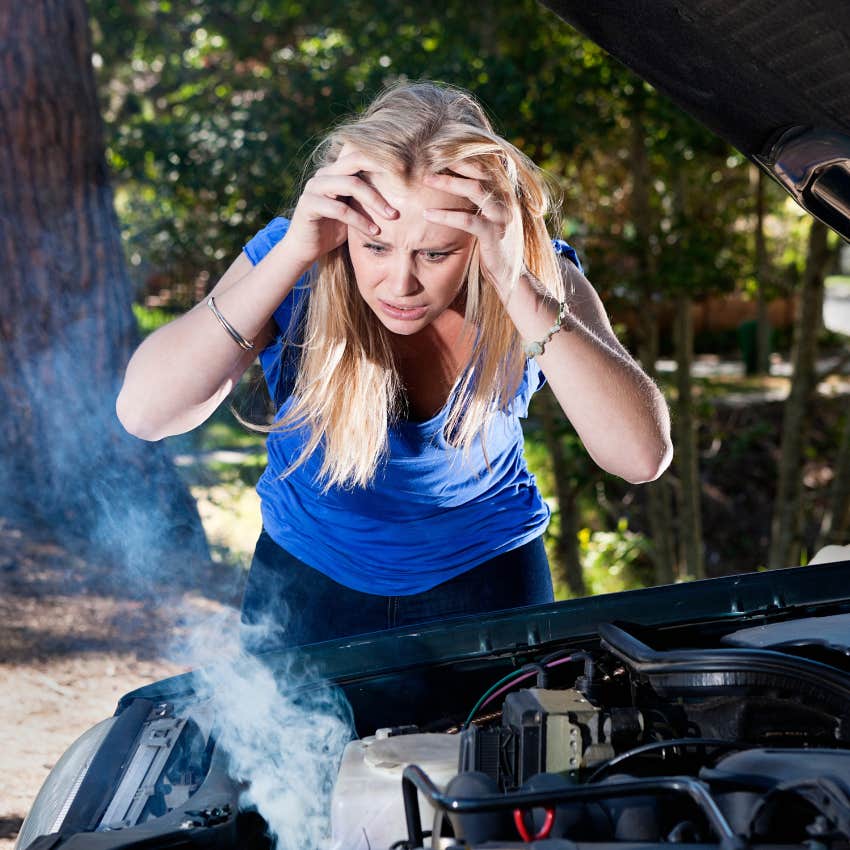11 Behaviors Of An Adult Who Was Raised By Parents Who Worried Too Much
You parents behaviors when you were growing up often dictate how you deal with things as an adult.
 Gladskikh Tatiana / Shutterstock
Gladskikh Tatiana / Shutterstock Our habits and attitudes are usually a product of both nature and nurture. We all pick up traits and behaviors from our parents, some good and some undesirable. Watching those who are responsible for showing us the ways of the world and how to navigate this thing called life can have a big impact on our ability to deal with its ups and downs.
A relaxed mother or father who knows how to roll with the punches when obstacles come their way tend to raise children who are mentally and emotionally balanced during life's ebbs and flows. But, parents who worry too much often have kids who exhibit behaviors that negatively influence their mental and emotional well-being.
1. They are anxious and stressed out
An adult who was raised by parents who worrried too much is likely to get easily stressed out. When we are young, we rely primarily on our caregivers to let us know how to navigate our world. We look to them in times of stress and conflict to model behavior that helps us remain calm and composed. But just because they are supposed to be the example of emotional stability, that does not mean that all parents can live up to that expectation, and the impact can be detrimental to children.
According to research, children aged two to six exhibit elevated mental health symptoms when exposed to a high degree of stress at home. But these symptoms can be mediated by how their parents dealt with those anxieties, as parents' behavior has a direct impact on their children's mental health.
2. They are emotionally insecure
 Kaboompics from Pexels via Canva
Kaboompics from Pexels via Canva
Insecurity is a feeling of uncertainty about yourself or your ability to make decisions. It is characterized by a lack of self-confidence, a fear of failure, and being rejected or judged by others.
Insecurity is formed as a result of many things, such as trauma you’ve experienced in the past, what you observed or learned in your early life, and your social surroundings and how you interpreted them. It's no wonder that watching a worrisome parent do mental and emotional acrobatics during the ups and downs of life can cause kids to do the same and grow into adults who also worry too much.
3. They struggle with low self-esteem
Children with parents who are constantly worried about their safety and their ability to exhibit strength, resilience, and confidence are more likely to develop low self-esteem, according to Dr. Gina Madrigrano. Similar to those who are emotionally insecure, they are scared of being embarrassed or making a mistake.
This lack of confidence in self for children can manifest as isolation in adults, as well as a tendency to seek the approval of others and an extreme bias toward perfectionism, none of which are necessarily a good thing, and all of which can inhibit progress.
4. They may be socially awkward
Parents who worry too much are usually overprotective, controlling, critical, and overbearing. Their offspring get comfortable with not having the autonomy to decide what is best for themselves, and that carries over into adult life. They tend to avoid social interactions due to uncertainty, anxiety, and a lack of social development due to an over-reliance on their parents.
These missing social skills show up as awkwardness to the outside world, further causing the impacted adult child to go within and avoid those interactions. Those whose parents push them to be more social don't fare much better, as this just increases their anxiety and makes them even more unlikely to engage with others, according to Dr. Marcy Willard, PhD.
5. They have trouble being independent
Parents who worry too much inadvertently create children who lack independence and grow into adults who are codependent. Because they have never been allowed to make mistakes or decisions regarding themselves, children of anxious adults never develop the confidence to move through life on their own.
The extreme dependence on their parents eventually moves into codependence on partners they need to help them decide what is in their own best interests. These are the adults who seem to be lost when they are alone, believing that they need someone else to save them because they cannot save themselves. On the flip side, they may take on the characteristics of their parents, believing it is their job to save others.
6. They can't solve their own problems
 Rapid Eye from Getty Images Signature via Canva
Rapid Eye from Getty Images Signature via Canva
When parents overprotect and never allow their kids to fail out of fear, they take away the ability for them to problem-solve. They create an environment where their children do not believe in themselves or their analytical skills enough to find solutions to their troubles.
This dynamic can be seen in adults routinely labeled as a "momma's boy" or "daddy's little girl." They embrace the overbearing nature of their parents because it makes them feel safe and secure and takes the onus off of them to be responsible for their own life choices.
7. They are more susceptible to depression
Not only does passing down worry create anxiety in adult children. It also increases the likelihood that they will suffer from depression. Craig N. Sawchuk, Ph.D., L.P. noted that though depression and anxiety are separate mental health conditions, they commonly occur together. Both conditions even originate from the same region of the brain.
Adult who tends to worry about everything usually exhibits a form of anxiety, which is commonly a symptom of depression, and vice versa. Worrying alone can create a feeling that you are unable to overcome your circumstances, resulting in a depressed state that might require treatment and medication.
Reducing the amount of worry in your life and focusing on things that are within your control can do wonders for avoiding both anxiety and depression.
8. They don't maintain boundaries
Parents who impart their presence in every part of their children's lives, protecting them from the slightest harm or necessary failures, teach their children that boundaries are nonexistent. Moreover, those parents have an extreme desire to keep their children close and will let them overstep boundaries to keep them from becoming upset and distancing themselves.
Those kids become adults who repeat the same patterns, overstepping in their own children's affairs, trying to control them, or going along to get along in order to avoid creating distance between them. This cycle can continue generation after generation, leading to a familial lack of boundaries that will eventually result in conflict and rebellion.
9. They suffer from burnout
 PeopleImages from Getty Images Signature via Canva
PeopleImages from Getty Images Signature via Canva
We already know that inherited excessive worrying creates anxiety and potentially depression. But, according to a review of research, it can also create emotional exhaustion, cynicism, and a reduced feeling of personal accomplishment that can result in burnout. It's easy to follow the roadmap of cause and effect. Worry creates anxiety that creates depression that eventually creates burnout.
The constant worry about being good enough, avoiding negative judgment, being perfect, and doubting your abilities is tiresome. Those things, coupled with the energy and exertion it takes to walk through life and meet your goals on a daily basis can lead you to crash and burn, causing you to move into a fight or flight mentality or lose motivation.
10. They tend to procrastinate
An adult who was raised by parents who worried too much often has an inability to trust themselves or worry too much, which can lead straight into analysis paralysis, a condition where procrastination overtakes you and you are frozen, unable to decide whether you should go one way or the other. You lack the confidence to move forward and instead sit in a state of fear that whatever direction you go will be the wrong one.
Studies directly link worry, anxiety, and depression together, the latter being used as a coping mechanism to manage difficult tasks, emotions, or decisions. Conversely, high anxiety can initially light a fire under you, causing you to take action upfront, but may eventually lead to the aforementioned burnout.
The best way to avoid procrastination is to take a balanced approach to tasks and decisions that allows continuous progress and minimal stress.
11. They have a strained relationship with their parents
A helicopter parent who constantly hovers, worried that something bad might happen if they don't, has the opposite intended impact on their children. The children grow up to be resentful adults, upset by the anxiety their worried parents brought into their lives. They may long for the independence they had long been deprived of and put distance between them and their overly involved parents.
The parents can feel unappreciated, believing their efforts are unappreciated, and feeling forgotten by the children they have cared for so much and protected from the woes of the world. This back-and-forth dynamic can get in the way of adult children forming healthy relationships.
NyRee Ausler is a writer from Seattle, Washington, and the author of seven books. She focuses on lifestyle and human interest stories that delivers informative and actionable guidance on interpersonal relationships, enlightenment, and self-discovery.

